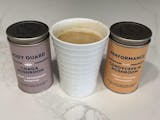Reishi and its Activity Against Bacterial Infections
Reishi and its Activity Against Diseases
Similar to viral infections, the goal of research in the treatment bacterial infections is the discovery of agents that specifically suppress bacterial multiplication without affecting normal cells. The undesired side effects of antibiotics make the development of new agents an urgent requirement, which has led researchers to investigate the antibacterial activity of medicinal fungi.
For evaluating the antibacterial effects of Reishi extracts, several test tube and animal studies were performed.
In one of these studies, mice infected with E.coli were given Reishi extracts (both water and ethanol extracts), showing markedly improved survival rates of over 80% compared to controls at 33% who were not given Reishi extract. (1)
An extensive in-vitro study in South Korea monitored the direct antimicrobial effect of a Reishi water extract against 15 species of bacteria alone and also in combination with 4 kinds of antibiotics (ampicillin, cefazolin, oxytetracycline and chloramphenicol) found in the pharmacy in order to compare potency. Reishi was found to be more effective than antibiotics against E. coli, Micrococcus luteus, S. aureus, B. cereus, Proteus vulgaris, and Salmonella typhi, but less effective against other species tested.
The antimicrobial combination of Reishi with the four antibiotics mentioned above resulted in an additive or synergistic effect in most, which means there was a combined effect greater than the sum of their separate effects. (2)
Warning: the only antagonistic effect found in this study was combining Reishi with cefazolin and ampicillin on P. vulgaris. Reishi was best used alone in this case. (2)
The study above shows potential use of Reishi against bacteria that causes many of the symptoms mentioned below:
-
E. coli- usually caused by eating contaminated food (symptoms include bloody diarrhea, dehydration, or even kidney failure) (3)
-
Micrococcus luteus- found in many places such as the human skin, water, dust, and soil. Usually caused by bad hand-washing practices. (symptoms include skin infections) (4)
-
S. aureus- found in the environment and in normal human flora. Caused by touching infected blood or body fluids, most often by contaminated hands. (symptoms include skin and soft tissue infections, such as abscesses, boils, furuncles, and cellulitis (red, swollen, painful, warm skin) (4)
-
B. cereus- also caused by eating contaminated food (symptoms include abdominal pain, watery diarrhea, rectal tenesmus, nausea, vomiting) (5)
-
Proteus vulgaris- causes urinary tract infections (symptoms include pain or burning during urination, frequent urination, abdominal pain, fever and chills, fatigue) (6)
-
Salmonella typhi- usually caused by eating food or drinking water that has been contaminated by feces. (symptoms include nausea, vomiting, abdominal cramps, diarrhea, fever, headaches, blood in stool) (7)
Click on other conditions to continue exploring studies done on Reishi:
References:
1. Ohno N, Miura N. N, Sugawara N, Tokunaka K, Kirigaya N, Yadomae T. Immunomodulation by hot water and ethanol extracts of Ganoderma lucidum. Pharm Pharmacol Lett. 1998;4:174–7
2. https://www.ncbi.nlm.nih.gov/pubmed/10319155
3. https://www.ncbi.nlm.nih.gov/pmc/articles/PMC3645889/
4. https://www.ncbi.nlm.nih.gov/pmc/articles/PMC4120257/
5. https://www.ncbi.nlm.nih.gov/pubmed/20375358
6. https://www.ncbi.nlm.nih.gov/pmc/articles/PMC5080321/
7. https://www.ncbi.nlm.nih.gov/pubmed/25208300

